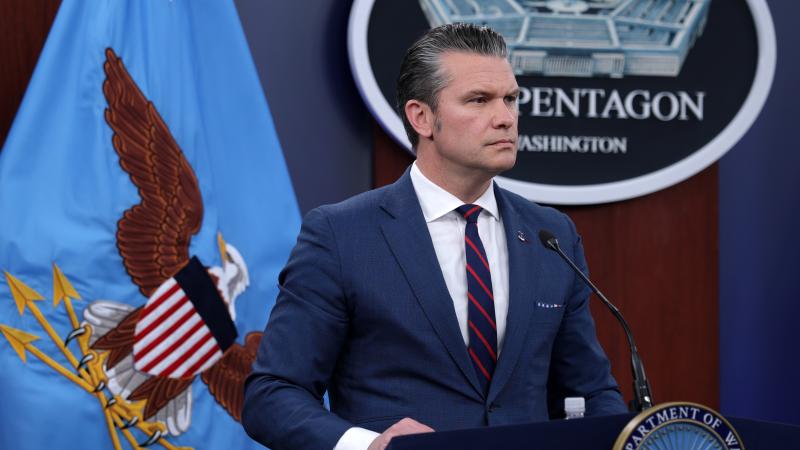US leaks of Israeli covert ops against Iran eroding trust, security ahead of Biden visit to region
Many observers believe leaking this information is tied to the Biden administration's efforts to revive the 2015 Iran nuclear deal.
As President Biden prepares to visit Israel and Saudi Arabia next week, experts and former officials are warning that an often-overlooked issue risks undermining efforts to increase cooperation among U.S. allies in the Middle East.
That issue is anonymous U.S. officials consistently leaking information to the media about alleged covert Israeli operations against Iran, from targeted killings to explosions at nuclear sites.
"It's a sign of extraordinary incompetence and unprofessionalism from Biden and his foreign policy team," said Fred Fleitz, a former CIA analyst who also served as a senior staffer on both the House Intelligence Committee and the National Security Council. "It's outrageous they would leak this kind of information."
Unnamed officials recently told CNN that Israel has ramped up its covert attacks in Iran and is largely keeping the U.S. in the dark.
A month earlier, an American intelligence official leaked to the New York Times that Israel told Washington it was behind the assassination of top officer in the Islamic Revolutionary Guard Corps (IRGC), an Iranian military force and a U.S.-designated terrorist organization.
The leak infuriated Israeli officials, who often share intelligence with American counterparts.
"It mainly harms trust," Ram Ben Barak, who heads the Foreign Affairs and Defense Committee of Israel's parliament, said at the time.
"We have very many close relationships and a lot of cooperation between us, which all depend on trust, and when it is violated in some way then it damages future cooperation," he added. "I hope the Americans investigate the leak and figure out where it came from and why it occurred."
Former Israeli Ambassador to the U.S. Ron Dermer explained on the podcast "Diplomatically Incorrect" that the Biden administration seems to be trying to distance itself from Israel by putting the blame on Jerusalem and keeping Washington out of it.
"That's very disturbing because that would only encourage attacks against Israelis," he said. "The fear of potential American action against Iran or other actors, that actually deters aggression. For the United States to think they're going to stabilize the situation by distancing themselves from Israel not only endangers Israeli citizens and officials but it actually also makes the chance of an attack much higher."
Interpreting these leaks as a "message to Israel that the U.S. disagrees with the action that was taken," Derner said, "And essentially what that means is they are trying to curtail Israel's freedom of operation" to combat Iranian aggression.
Such leaks have been occurring for years, indicating the problem is entrenched within America's national security bureaucracy, not just among political appointees. During the Obama administration, anonymous U.S. officials told media outlets about Israeli military plans to strike Iran's nuclear facilities. During the Trump administration, officials confirmed Israel bombed Iranian targets in Iraq.
However, the leaks have been occurring with striking frequency since Biden entered office. Last year, for example, unnamed U.S. officials told the Wall Street Journal that Israel had been attacking several Iranian ships.
"This decreases trust," said Jason Brodsky, policy director of United Against Nuclear Iran. "I think it's irresponsible for any U.S. official to seek to implicate Israel in an attack in Iran using anonymous quotes in the media. Unfortunately, all too often, we have seen this tactic employed in the past, likely to express disapproval and send a message that Washington was not part of the operation."
These leaks, added Brodsky, risk "provoking Iran to retaliate against a U.S. ally in the region."
The Biden administration has warned Israel against what U.S. officials described as "counterproductive" operations targeting Iran's nuclear program.
Iran's leaders frequently pledge to destroy Israel, which views a nuclear-armed Iran as an existential threat.
Israel's embassy in Washington didn't respond to a request for comment for this story.
Repeated U.S. leaks to the media have led Israel in many cases to give as little notice as possible to Washington about operations against Iran.
Many observers believe leaking this information is tied to the Biden administration's efforts to revive the 2015 nuclear deal, which placed temporary curbs on Iran's nuclear program in exchange for lifting large-scale sanctionsIran on Iran.
Former President Trump withdrew the U.S. from the deal in 2018, and Biden has made it a top priority to reverse that decision through so-far-unsuccessful talks with Iran and other world powers.
"These leaks are troubling because they undermine one of the closest intelligence and security relationships in the world just for the sake of nuclear deal negotiators who are desperate to make sure their Iranian counterparts don't think the U.S. is complicit," said Richard Goldberg, a senior adviser to the Foundation for Defense of Democracies who previously served on the White House National Security Council. "It's not like anyone thinks it's someone other than Israel carrying out these attacks."
Israel opposes a revival of the 2015 nuclear deal, which allows Iran to develop an industrial-sized nuclear program.
Fleitz argued Biden wants to "sabotage" Israeli covert actions in order to help his administration's nuclear talks with Iran.
The White House didn't respond to a request for comment.
Several observers told Just the News that Israel has essentially decided to take matters into its own hands to stop Iran's nuclear advancements, believing the Biden administration won't take certain actions out of fear of jeopardizing nuclear talks and escalating tensions with Iran.
"When the founding principles of Iran are dedicated to destroying the state of Israel, the Jewish state has a right to defend itself," said Brodsky. "When the world is busy chasing after an Iran nuclear deal while ignoring the urgent non-nuclear security concerns of Israel, it can't be surprised when Israel resorts to self-help."
Brodsky added that, despite current disagreements over Iran, the U.S.-Israel alliance will endure.
However, Israel isn't the only country affected by U.S. leaks to the media about Israeli operations.
"It hurts our relationships with other countries," said Fleitz. "We get crucial intelligence from foreign countries that is needed to save lives."
He added these countries may be more hesitant to share information with the U.S. if they think it may be leaked to the press.
Such concerns are especially relevant amid reports that the U.S. and Israel are trying to lay the groundwork for an alliance with Arab states that would connect regional air defense systems to combat Iranian drone and missile attacks.
Such an idea would have been unthinkable not long ago. But the Abraham Accords, a series of historic peace agreements between Israel and Arab states brokered by the Trump administration, opened up several potential new opportunities.
Israel hopes it can work with the U.S. to expand the accords to include Saudi Arabia, which hasn't committed to any such arrangement and is reluctant to move too quickly on normalizing relations.
However, the Saudis are reportedly considering a trilateral meeting with both the U.S. and Israel next week when Biden is in the Middle East — a major step for a country that's long opposed the Jewish state.
The administration's apparent efforts to foster greater Arab-Israeli cooperation come after months of being criticized for appearing largely uninterested in building on the Abraham Accords, one of Trump's key foreign policy legacies.
Last May, when asked about the status of the accords, the then-White House Press Secretary responded, "Aside from putting forward a peace proposal that was dead on arrival, we don't think they [the Trump administration] did anything constructive, really, to bring an end to the longstanding conflict in the Middle East."
At the same time, the Washington Free Beacon reported the State Department was discouraging employees from referring to the accords by their official name, erasing the name from official communications and instead using the term "normalization agreements."
Several analysts described Biden's tepid follow-up to the Abraham Accords as a missed opportunity.
The State Department didn't respond to a request for comment for this story.














